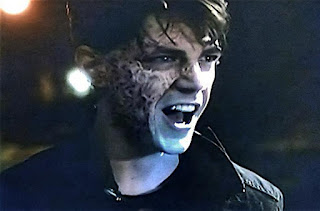"The only thing that scares me, is being forgotten."
~ Mr. Wednesday, American Gods
If you have any interest in history, mythology, fantasy and horror you should tune in. The TV series, based on the Neil Gaiman novel, is a weird, slow burn pocked with moments of extreme violence and bizarre visuals. It's fantasy Americana and from what I've seen, it's one you won't want to miss. Let me put this like: "It is Game of Thrones with everyone being God."
The story follows Shadow Moon (Ricky Whittle) a recent ex-con and child of hippies as he leaves prison, only to find his world turned upside down. He runs into the mysterious Mr. Wednesday (Ian McShane) and the two embark on a great adventure into America's forgotten heartland and unseen places. It's not your average TV show or your average fantasy, and I won't spoil it any more with summary than this barebones premise. Instead, here's a handful of reasons why you should tune in tonight.
American Gods is a road trip movie unlike any other.
Fans of Logan might want to take note here. That film eschewed super-hero movie conventions, coupling Western themes and road trip adventure rather than grand, flashy special effects and time travel. American Gods is a road trip fantasy, scrawled out across the green fields of the Midwest. Its magic is not exactly mundane, but it casts aside genre tropes and plucks its mystery from the pages of history and custom.
Indeed, American Gods is less urban fantasy than rural fantasy. Our heroes avoid freeways. Their journey takes them down the back roads of middle America. "You've seen one highway, you've seen them all," Mr. Wednesday snaps at Shadow as they drive. "No highways!" Stops in cities are fleeting. We are always simply Somewhere in America. And it turns out there's a magic to these lost and distant places.
American Gods is a story about immigrants.
Unlike most stories of immigrants, American Gods is less a story of individual people and more a story of the customs, history and, of course, gods of the immigrants, slaves and explorers who came to America. "This is the only country in the world that wonders what it is," Mr. Wednesday muses. Perhaps that's because American is made up of so many disparate pieces, so many stories and beliefs.
So we're introduced to various histories and immigrants, from stranded vikings to African slaves aboard a slaver's ship to Middle-Eastern cabbies. Many of these stories are introduced through short vignettes that take place alongside the main story rather than within it. In American Gods we see these beliefs in the flesh, as dwindling manifestations of once powerful conviction. The old gods, come to America, once-hot flames now merely embers in the smoldering pit of modern America.
American Gods asks us to question our faith in technology.
Fantasy and science-fiction are often lumped into the same genre, but in many ways they're completely at odds. The former is concerned with belief, magic, the unknown and inexplicable. The latter is obsessed with technology, science, and the tangible. In some ways, this is what American Gods is attempting to examine, this division between faith and science.
None of this is to say that fantasy and science fiction can't work toward the same thematic ends. Indeed, science-fiction often warns of the dangers of technology gone awry, of unchecked human meddling and the thirst for power. Science fiction as cautionary tale is a close neighbor to Tolkien's Lord of the Rings, which itself was a parable about unchecked power in the industrial age.
American Gods is the story of a war brewing between the Old Gods---those forgotten immigrant gods---and the New Gods: Media, Technology, Money. The things people used to worship and the things they worship now. These cheap newcomers and golden calves, big-screen TVs and social media stand in stark contrast to the brooding, mysterious and unfathomable old gods, whose power stems from blind obeisance and hard faith, or sometimes simply need. American Gods is the kind of show that happily throws our cell phone out the window. What does it mean to believe, anyways? What does it mean to reason?
American Gods embraces the absurd.
American Gods is a weird show. It's a fantasy set in modern America, that drifts between dreams and reality, airports and bone orchards, as easily as shadows between shade. The visual effects are outlandish rather than realistic, and Shadow's dreams often look like fantastical television sets. There's a twisted gaudiness to it that may not click with everyone. Personally, I found the art direction grew on me over time, as did much about American Gods. The magic here is real, but not of the sorcerous variety, and the show achieves many of its oddest moments by embracing the absurd.
The same often goes for the dialogue. We, as viewers, see more than Shadow does, privy as we are to the short vignettes and other perspectives. But we're still in Shadow's shoes, as confused and baffled as he is much of the time. Dialogue between the show's cast of mysterious characters is often opaque enough to leave us guessing. Especially if you're a newcomer to the story (and haven't read the book) you might find yourself wondering what exactly is going on. That's okay. You're supposed to be confused. Thankfully we have a great cast of actors and some splendid writing to help us along the way.












